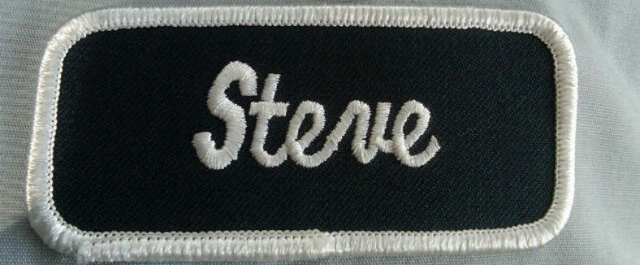Stephen Kolter
I suppose I’m a blue-collar poet. I have a factory job, yet I write poetry. My sporadic formal education has been all but forgotten. A lot of my poems are written while working at the factory or about working there. So, that settles it, right?
It was only within the last year that I realized there is such a thing as “blue-collar poetry”. We could possibly say that Whitman got the ball rolling with his odes to American life, though there are earlier examples from other countries. Sandburg kept it rolling for a while with an entire career of workman’s dirges in the beginning of the last century. Still, I felt like I was writing to their ghosts.
Whenever I would pick up a lit mag I would first flip to the contributors’ bios. MFA, MFA, BA with an MFA in progress, MFA. It seemed that we uneducated folk weren’t allowed to publish poetry. Or anything else, for that matter. “Take your played-out AC/DC songs and be happy!”
I thought I was weird, an anomaly. I mean I know the guys I work with don’t read anything but sports scores. In fact, their genius for interpreting statistics blows my mind. The only writing they do is on the bathroom wall. Still, am I that strange?
Then, one amazing day, I found out about a journal called Blue Collar Review and the door opened up for me. Starting there, I found tons of like-minded writers doing what I had been doing; working hard, writing when they could, and just doing the best they can in a world that doesn’t seem to want them to thrive. Eureka! I began buying their books and e-mailing some of them. A world finally opened for me.
I have tried to find a definition of “blue collar poet”. I found plenty of blue collar poets but nothing specifically about the subset as a movement. From what I’ve been told, a blue collar poet is someone who works. I don’t like to get too deep into exclusive delineations and won’t say what kind of work the poet must be employed in, but let’s just say it is usually something that makes you sweat.
I have also heard that blue collar poets ordinarily lack formal training. This is probably why they are working in a blue collar job in the first place. However, I don’t think a degree would necessarily bar someone from the gang. I would go to school if I could. Would that alone cast me out of Eden? It probably depends on whom you ask. I’m sure there are some anti-snob snobs who have a clear-cut set of mandates that are not to be broken. I hate that. That mindset is just elitist as the elitists it opposes.
To me, and I am an expert on nothing whatsoever, “blue collar poetry” is real. It deals with real life issues that real life people can almost unanimously relate with. Then, it spins that mundane universal into something beautiful, poignant, and maybe even profound.
There is more, though. There is a special kind of suffering in blue collar poetry, a confirmation that the poor in spirit, those who possess little in the way of tangible goods or power, truly are blessed. In fact, blue collar poetry is, at its very core, a beatification of those tiny figures nobody sees. Who made all your gadgets? Who brought you your coffee and eggs at the diner this morning? Whose sweat brought you your comforts? Your needs?
There is fight in the voice, a struggle with something very tangible yet alluding to the intangible. It is a fight to remain alive even if unnoticed. More than a fight, it is a celebration that we made it to this moment in time, roughed up, beaten and weary, but nevertheless very much alive.
One of the things I like most about what is usually called “blue collar poetry” is that its surface is easy to grasp yet the depths go on infinitely. If I like something about the story, I go deeper and deeper. There are no riddles to decipher in some secret post-modern language. I did enough of that in my few years of college. Give me something to make me want to read it again and find the universal truth hidden between the lines. That is what “blue collar poetry” usually does for me.
I close with reiteration of the assertion that I am not an expert. This is not meant to be a definitive article on a new movement in creative writing. I just want to get a discussion started. Maybe there is a new movement happening here that people will discuss in centuries to come. Maybe not. Or maybe there is someone who will read this who is just like me and is yet to discover that there are others of a similar ilk.
I am a blue collar poet. What’s more, there are legions of us out there working, struggling, surviving, writing. What we lack in formal education we make up for with grit. Honest, real-life, grit. There are calluses on our hands and feet, sweat stains on our undershirts, and silent prayers in our boisterous profanity. We write because we must. The compulsion in our spirits will not rest.
People have told me writing is a waste of time. Once in a while I even believe them. Yet, every day that little black notebook comes out of my back pocket and opens up like a door to a better world where all of this means something. I hope to find more people in that world. Together, we can affirm the stirring in our psyches that says, “Hold on. Keep your eye on the prize and never stop moving forward. Never.”
 Stephen Kolter is a poet, editor for Creeping Lotus Press, and a factory worker. Much of his writing is done on the factory floor or is about his co-workers. He has a chapbook of blue collar poetry titled From the Floor forthcoming from Cat in Sun Press. His work has appeared most recently in Blue Collar Review, Relief Journal, Lucid Moon, and other independent magazines. He won the 2014 Charlotte Simon Miller Award for poetry. Visit him on the web at www.stephenkolter.com.
Stephen Kolter is a poet, editor for Creeping Lotus Press, and a factory worker. Much of his writing is done on the factory floor or is about his co-workers. He has a chapbook of blue collar poetry titled From the Floor forthcoming from Cat in Sun Press. His work has appeared most recently in Blue Collar Review, Relief Journal, Lucid Moon, and other independent magazines. He won the 2014 Charlotte Simon Miller Award for poetry. Visit him on the web at www.stephenkolter.com.
